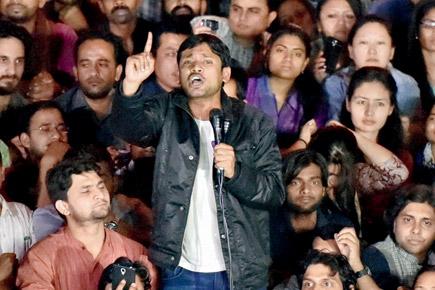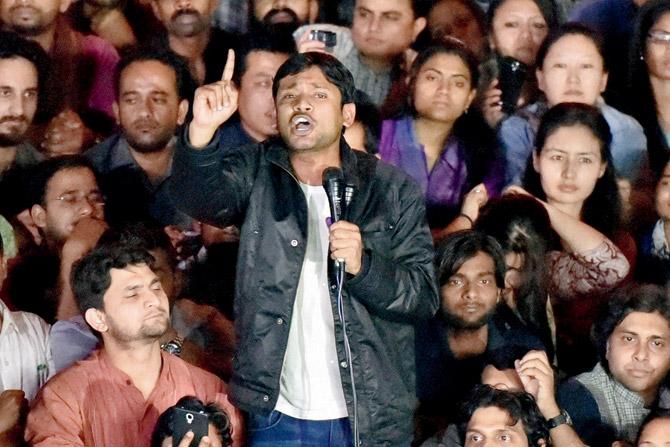Once there were two demon brothers, Ilvala and Vatapi. Unlike their namesakes in the Mahabharata, these two became prime minister and party president of a vast and diverse country we all know and love.

Kanhaiya Kumar
 Once there were two demon brothers, Ilvala and Vatapi. Unlike their namesakes in the Mahabharata, these two became prime minister and party president of a vast and diverse country we all know and love. The brothers, being demons, were not nice, as you could tell from their names: Ilvala sounds suspiciously like ill-will, and Vatapi means 'he who consumes life', which is why it kind of sounds like WhatsApp.
Once there were two demon brothers, Ilvala and Vatapi. Unlike their namesakes in the Mahabharata, these two became prime minister and party president of a vast and diverse country we all know and love. The brothers, being demons, were not nice, as you could tell from their names: Ilvala sounds suspiciously like ill-will, and Vatapi means 'he who consumes life', which is why it kind of sounds like WhatsApp.
ADVERTISEMENT
The two demons, after taking over country and party, developed an act. Vatapi pretended to be a ram; Ilvala killed and cooked him, preparing a delicious-smelling Wazwan. Wazwan, of course, is a multi-course meal of Kashmiri Muslims, the very people these demons want to consume till the Kashmir Valley is empty of the living. This wazwan is known as 'neo-nationalism'.

JNUSU president Kanhaiya Kumar addresses fellow students at the New Delhi campus upon his release on bail on Thursday. If you watch his speech on YouTube, it’s not just playful and folksy, but also reveals clarity of thought. Pic/PTI
Paralleling the Mahabharata, a victim is enticed by the aroma of neo-nationalism and is invited by Ilvala to sit and eat his fill. Once the plate cleared, Ilvala summons his brother with 'Vatapi atragacha' and Vatapi comes tearing out of the victim's tummy, killing the hapless but greedy soul. In the Mahabharata, it was sage Agastya who saw through the demons' ruse; he went along and once he finished his wazwan he rubbed his tummy and said 'Vatapi Jeernobhava', thereby digesting the demon. Ilavala tried in vain to summon his brother, but all he heard was a burp.
A recent victim of this neo-nationalism feast is the Opposition party. A former journalist who is now the IPL chairman — the quintessential journalist who is not a watchdog of democracy but bedfellow of the elite — recently proposed demilitarising the Siachen Glacier during winters. This proposal may have originated with the late Rajiv Gandhi. It comes after the recent death in an avalanche of Lance Naik Hanamanthappa and nine others. Siachen is an inhospitable place at any time of the year, filling the military hospital at Leh with cases of frostbite, and pulmonary and cerebral oedema.
This proposal, though humane, is ill-thought out. The IPL chief forgets that it is focussed on the jawan but not on the true reason that India sits atop the Siachen glacier — for tactical and strategic advantage. This proposal would only work if there was a treaty on Siachen, which looks as distant as an agreement on Kashmir; and, hypocritically, the Congress rubbishes any initiative of Modi with regard to Pakistan.
The Congressman was simply gorging on neo-nationalism — after all, in the current climate deliberately whipped up by the demons — in which militarism is an end in itself — everyone must go a step further to prove their patriotism. The Congress is blindly walking into a trap, losing sight of the fact that the military is a tool of national power and not for scoring political points. Anytime soon, Vatapi is going to tear apart the Congress's tummy.
Another guest at the neo-nationalism feast is the Delhi High Court judge whose bail order in the sedition case against Jawaharlal Nehru University Students Union president Kanhaiya Kumar reads like the aftermath of the Ilvala-Vatapi act. The court was to adjudicate sedition but instead Justice Pratibha Rani made a political speech about anti-nationalism — which is not a crime — and infections, and also about soldiers keeping vigil on the border. Her bail order reminds you of what happens when you overeat. You vomit. She over-ate Vatapi's neo-nationalism and militarism. The day is not far off when demons rupture the judiciary's mid-section, ripping this pillar of democracy to shreds.
Kanhaiya Kumar is no sage Agastya: he propounds an ideology that failed with the Soviet model in 1991; also, his comrades' record of governance leaves us no reason for optimism. Yet Ilvala and Vatapi tried to shove neo-nationalism down his throat, by having him beaten and taunted at Delhi's lower courts by some low-level lawyers, and then jailing him for 20 days. Kanhaiya emerged psychologically energised. If you watch his speech on YouTube, it's not just playful and folksy, but also reveals clarity of thought. It is no doubt the best way to combat the demon brothers' attempt to polarise voters between nationals (read Hindus) and anti-nationals (read Muslims).
“Maha-burbak”, Kanhaiya dismissed Ilvala-Vatapi's strategems. The demon brothers can't digest the fact that he digested them completely. Students have historically come to society's rescue and today, it's no different. We still have three years of state-endorsed rowdyism to put up with, but it's comforting to know that our youth are up to the challenge.
Less heartening, however, is that even students have to resort to the caveat of stating their support of the military. Silly; that's always existed, even if unstated. It proves that even if we never again see Ilavala-Vatapi after 2019, they have irrevocably changed the fabric of our public life, making it bitter, not better.
Journalist and writer Aditya Sinha is the co-author of Kashmir: The Vajpayee Years. He tweets @autumnshade
Send your feedback to [email protected]
 Subscribe today by clicking the link and stay updated with the latest news!" Click here!
Subscribe today by clicking the link and stay updated with the latest news!" Click here!






